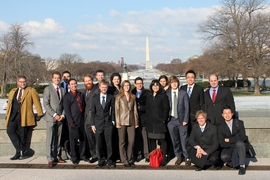On April 11-13, 24 MIT graduate students traveled to our nation's capital to participate in the annual Science-Engineering-Technology Congressional Visits Day (CVD). The Science Policy Initiative (SPI), a student group that recognizes the need for scientists’ involvement in policy formation, organized the trip. This was the 10th consecutive year that a delegation from the MIT participated in CVD.
The students’ goal was to communicate to congressional members and their staff the importance of sustainable, long-term federal investments in science research and development funding. In President Barack Obama's 2017 budget, overall R&D investment totaled $152 billion, a 4 percent increase from 2016. However, this is just a small increase considering that last year's R&D funding, as a share of the total federal budget, was the lowest it had been in 50 years. Moreover, the president’s proposed budget only restores funding for federal agencies that support scientific research back to fiscal year 2012, before budget cuts experienced during federal sequestration.
In total, the MIT students had 61 meetings with members of the Senate and House of Represenatives, as well as their staff, sharing how federal funding benefits them personally, their home states and districts, and the national economy as a whole. "Every industry and special interest group has its lobbyists. If we [in the scientific community] don't advocate for ourselves, no one is going to do it for us," said trip organizer Scott Grindy, a graduate student in the Department of Materials Science and Engineering.
On their bipartisan visit, the MIT students spoke with 29 Democratic offices and 32 Republican offices. For Congress members such as Rep. Mike Capuano, whose district includes MIT and Boston University, the impact of R&D investments on constituents is clear. Many students were eager to speak with Republicans, who, with a majority in Congress, have made recent overtures to support continued federal investments in scientific research by passing the 21st Century Cures Act in the House. The bill, which has yet to be considered in the Senate, includes an additional $9 billion in funding to the National Institutes of Health (NIH) over the next five years.
While in Washington, the MIT group was briefed by Kate Stoll and Bill Bonvillian from the MIT Washington Office on the status of federal R&D funding and the role MIT is playing to promote federal investments in basic research. MIT recently authored a report entitled “The Future Postponed” underscoring why declining investments in basic research threatens an “innovation deficit” in the future.
The MIT students also asked congressional members to support a collective of $54 billion in fiscal year 2017 funding for NIH, the National Science Foundation, NASA Science and Department of Energy Office of Science, which matched the requests of MIT, Harvard University and Boston University in a letter circulated to Massachusetts congressional representatives and senators.
“Policy-making is a long and hard process and with a tight federal budget, tough funding decisions need to be made,” said Georgia Lagoudas, a graduate student in the Department of Biological Engineering. “Small conversations and visits with your representatives can help put a face to the issue and are powerful moments to promote the necessity for scientific funding.”
















